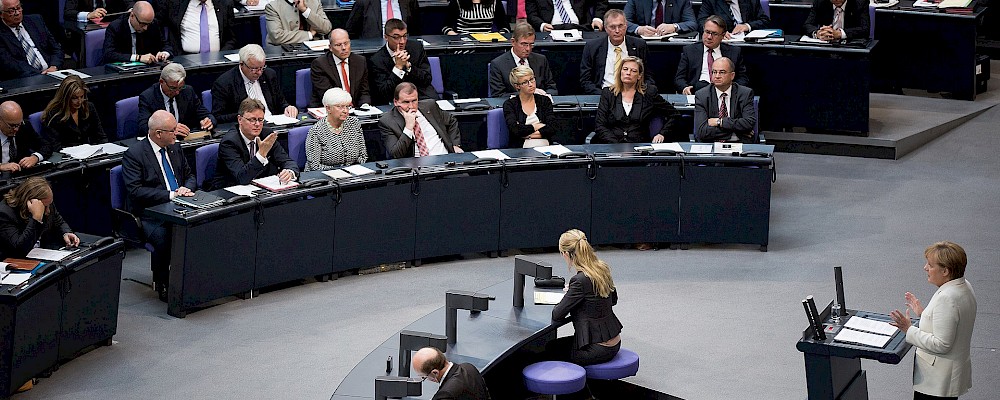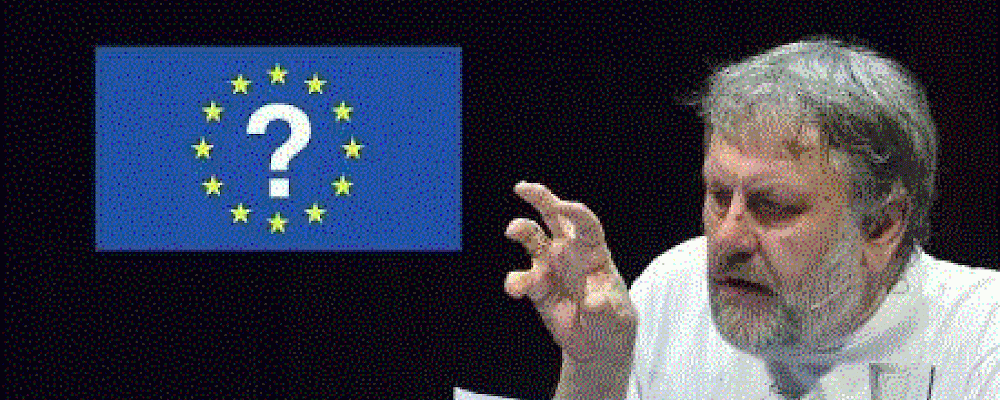Globalization and Political Economy: The true Essence of Populism
„Every political economy is desperarate in its own special way“ (Manow 2018: 23). Transferred into the field of social science, the introductory sentence of Tolstoi’s Anna Karenina is one of the central ideas Philip Manow states in his 2018 published book "Die Politische Ökonomie des Populismus".

Following the Anna-Karenina-principle, each and every national economy faces different problems and thus, also face different forms of protest. According to this logic, there exist different forms of capitalism that entail different forms of populism.
Initial Situation
Populism, left- or right-wing, turned out to be a rather popular phenomenon within the past few years and many academics and theorists try to find sufficient explanations for this uprising development. Since the last EU-election has depicted an obvious rise of populist partys, especially right-wing ones, the debate about populism has gained new actuality. Now, western democracies fear their liberal character to be endangered, especially because it took them so long to establish after WW2. With his new book, Manow presents another perspective to the present debate on populism, but rather to criticize the debate itself. His main point of criticism is to explain populism almost exclusively from a cultural perspective. Instead, he introduces an internationally comparable concept called the political economy of populism.
His main thesis states that populism is a protest against globalization. More specifically, Manow is able to show that countries in the South of Europe tend to vote for left-wing populist parties (Syriza in Greece or Podemos in Spain) whereas the northern European countries favourize right-wing populist parties (German AfD or Sweden-Democrats). Following this assumption, countries with flourishing welfare states appear to support anti-migration policies somewhat more then countries suffering a rather low social state level. There turns out to be a natural paradox within this discovery: A prospering social state and a high employment rate seem to correlate with right-wing populist policies.
Dani Rodrik's Paradox of Globalization
In Manow’s understanding, political economy means the entanglement of national state organization together with a state‘s capitalist regulations. To put it differently, he is referring to the relation of economy and hegemony. Manow obtains his defintion of political economy from the Harvard economist Dani Rodrik, who understands the populist phenomenon as a reaction to globalization (a detailed analyses of the problematic relationship betwenn globalization and democracy is given in Rodrik’s main work from 2011 Das Globalisierungsparadox – Die Demokratie und die Zukunft der Weltwirtschaft). In this sense, Southern populism is a reaction to neoliberalism – explicitly against free movement of money and commodities – whereas Northern populism responds to migration, so to say the free movement of persons (Rodrik: Populism and the economics of globalization, 2018). Following Rodrik, an explanation for this phenomenon is the experience of a potential threat within the populist elactorate. Manow adapts to Rodrik’s assumption that right-wing populism increases in countries, „ where extensive welfare states had the ability to mitigate negative impact of the movement of goods“ (transl. A.S.). Already in 2011, Rodrik has stated that the „economic globalization became its own purpose“ (2011:19, transl. A.S.). He has based his observations on the so called „Kompensationstheorie der Globalisierung“. This theory sees a flourishing welfare state primarly as a promise to appease potential export trade losers. Subsequently, Manow understands right-wing populism as a possible future-threat rather than as a result of current problems.
The Phenomenon of Populism
It is Manow’s adaption of Rodrik’s assumptions that differentiates his explanation of populist phenomena from other popular debates on this topic. Explicitly, it is three currently discussed theories, the political scientist critizies the most: Jan-Werner Müller’s standard defintion of populism, the wide-spread thesis of loser’s of modernization and finally the common argument, that populism needs to be understood as the consequence of a societie’s separation into communitarians and cosmopolitans.
Müller defines populism – in specific contrast to Manow and Rodrik – as a „form of identity politics“ characterized by „anti-pluralism“ and „anti-elitarism“ (Müller: Was ist Populismus?, S. 93). He pictures an antagnoistic relation, ‚We against Them‘, a juxtaposition of a „ moral homogen population“ and an „immoral, corrupt elite“ (ibid.). Manow instead, rejects the idea to explain the reason for the current populist popularity with identity or cultural politics. He argues, that the Sweden-Democrats, for instance, are not by nature more likely to be xenophobic than supporters of Spanish Podemos (see Politischer Populismus als Ausdruck von Identitätspolitik. Über einen ökonomischen Ursachenkomplex, in: Aus Politik und Zeitgeschichte). Manow furthermore criticizes, that Müller, and Andreas Reckwitz („culturalization of politics“), whose argumentation is similarly to Müller’s, tend to mix up the consequences with the roots of the populist problem. Their analyses are too morally and too less from a political economy perspective: „It is problematic, that their analyses interpret populism from an elitist perspective, that itself is part of the diagnosed problem.“ (Manow 2018: 31)
The second explanation Manow refers to imagines populistic voters to be the loosing group of the ongoing global transformation. Radical changes in social politics, structural modifications and economic modernization processes are likely to evoke right-wing populism with people who do not gain profit out of these rapid alterations. Manow argues that this assumption is not empirically valid, since the correlation of a right-wing populist elactorate with globalization-losers has alreaday been widely neglected in academic contexts. It is not only the economically and socially marginalized to support right-wing populist parties. „The new precariat“ (72) rather tend not to vote at all. Furthermore, he problematizes the focus on singular phenomena, as an „individual data collection“ (73) is inadequat to explain populist occurences. It missest he fact, that voters of populist parties vote differently in different states (see Politischer Populismus als Ausdruck von Identitätspolitik. Über einen ökonomischen Ursachenkomplex, in: Aus Politik und Zeitgeschichte).
A third theory refers to a cultural rift between supporters of a local, national identity – the so called communitarians – and the globalization-winners – the cosmopolitans. On the surface, one can say that the first group rejects globalization, migration and suprastatal political acting, whereas the second group – the ‚citizen of the world‘ – support open borders and universal human rights. Manow again critizises that the theory primarly focuses on cultural interpretation. Although he partly supports the ‚Kulturkampf‘-idea (see 34), he urges to remeber „that there are many different situations that lead to either right oder left-wing populism.“ (ibid., transl. A.S.)
Towards a Political Economy of Populism
Instead of a „moral claim to sole representation" (35, transl. A.S.), Manow’s book offers a complicated entanglement between economic and cultural challenges within the European states. By analysing the elections results of the past years together with the development of the countries‘ welfare states and labour markets – their political economies – he is able to prove a wide geographical variation with regard to the populist phenomenon. Manow’s analysis culminates to divide Europe into a North/South-dimension and an East/West-dimension.
The North of Europe – including the Scandinavian countries and Germany – is characterized by a generous welfare and social state, as well as being focused on export strategies. At the same time, these countries react rather hostile towards increasing migration. Consequently, in this case one can speak of a right-wing populist tendency which seems to be a „reaction to distributional consequencesdue to a national loss of border souvereignity" (36). Regarding the German AfD, Manow’s analysis seems to prove itself: The AfD electorate primarly lives in prosperous regions. Furthermore, he is able to show that the partie’s rise correlates with an economic upswing (76) and that a majority of its voters belong to the group of employees. These findings do not fit with the popular thesis of globalization-losers (90). Nontheless, on the basis of this one can critically question, whether he would support the thesis that migration endangers the social state.
Also, Manow recognizes a connection between the unemployment rate of 2000 and the rise of the AfD in 2017, whereas the current unemployment situation does not seem to affect the election tendencies (94). Hence, one can assume that the rassist AfD profits from a part of society that already has suffered from or fears unemployment which culminates in populist (voting) behaviour after the so called ‚migration crisis‘. „The Afd-electorate suffers from reminiscences that had been reactivated due to the happenings in 2015 and the following years“, Manow writes in his book (100, transl. A.S.). He validates Rodrik’s observation, that populism is a result of potential rather than existing realities. It is the same argumental structure he cites to critize the communitarian vs. cosmopolitan-thesis:
With this division theory, a possible answer to the paradox situation why it is especially the winners that tend to show populist behaviour would be, that it is rather a group of culturally estranged people which is not congruent with the economic precariat. (75, transl. A.S.)
In contrast to the North of Europe, the Southern countries are not threatened by a global labour market as they do not focus on export. Instead, they concentrate on domestic transport and thus, are not forced to call in the state in order to compensate the risks of a global labour market (see 53). This findings strengthen the assumption that a weak welfare state does not lead to a socio-political distribution problem as there simply are no social benefits for migrants to acquire – and even if there are some, they only satisfy a small and privileged group. With this argumentation Manow validates his thesis, that the Southern population used its (left-wing) populism against EU’s austerity policy, no matter if they are labour-market-insider or labour-market-outsider (see 63). Southern populism does not react to a loss of national souvereignity of borders but in Manow’s sense, it is a „ „reaction to distributional consequences due to the loss of national souvereignity of money.“ (37, transl. A.S.)
As for the North of Europe, its Eastern and Western parts have a similar problematic attitude towards migration (see 68). But the political scientist stresses, that this is not because these countries fear their welfare states to be threatened – for the simple reason that such a welfare state is neither existent in the Eastern nor in the Anglo-saxon countries. Manow explains this condition by referring to the fact that the first turned out to be the ‚great losers of globalization‘ since EU’s expansion towards the East and the latter refused to establish a welfare state due to its liberal and flexible labour market structures (see bpb). Instead, for a valid analyses of the populism-phenomenon within these countries, he proposes to distinguish between labour- and forced migration. In comparison to populism in the North, which tends to reject forced migration and is pushed by labour market insider, Eastern and Western Europe primarly attack labour market migrants and is therefore pushed by labour market outsider. They see the labour-migrants as potential competitants. More explicitly, Manow recognizes a congruence between labour-migration and states, whose labour market is based on regulations as between forced migration and countries with a generouse welfare state. Concerning the South of Europe, neither labour-nor forced migration is an important factor (see 67).
All in all, one can read Manow’s analysis as a profound supplement to the existing analyses on the populist phenomenon, as nearly all of the existing ones seem insufficient. Neither an exclusively cultural explanation nor an explanation based on the myth of globalization losers seem to be crucial factors to explain geographical variation with regard to populism. Rather, it is a complex entanglement between a state’s economy and welfare state model, its foreign trade policy and its different challenges regarding globalization. Furthermore, it is important to include factors like labour or forced migration as well as the division of labour market insider and outsider into the analysis. Manow stresses the importance of context and urges to avoid generalization.
The Danger of Left Nostalgia
Keeping his understanding of globalization in mind, it is not estonishing that Manow is of the opinion that populist protest rises due to anit-european resentment and a result of national egocentricity. Free movement „of money, goods and persons ... is most influential in a European attempt. Thus, the European geography of the populist phenomena is tob e understood as a protest against Europe.“ (131, transl. A.S.) With an almost nostalgic view, Manow recalls the days of national borders and currencies and forsees the failure of an international EU-project (138). Unfortunately, he fails to give a constructive solution himself and solely accuses neoliberalism to be the greatest enemy of all – like it is typicall for a loyal supporter of left-wing politics. One gets the impression that it is his main aim to criticize the disregard of class policy in total (see 30). He does not seem to be aware that he himself threatens to fall into trite clishés, like he accuses other analysists of (explicitely, he accuses social scientists to explain the problem of populism with the simple fact that „workers are no academics“ and „are thus less educated which goes along with being less cosmpolitan and tolerant“ (32, transl. A.S.). Reading this, one is clearly reminded of Wagenknecht’s popular EU-criticism.
Nevertheless, his internationally comparable concept of political economy seems to be way more differentiated than other concepts on the phenomenon of populism. It clearly states that cultural conflicts are only part of the problem. However, one can get the impression that the contrast between Nothern and Southern Europe is too harsh. Taking for instance the rising popularity of the extrem right-wing Spanish VOX into account, as well as the Greek Chrysi Avgi (golden dawn), one has to question the simple correlation between Southern states and left-wing populism. Unfortunateley and despite his diverse analysis, Manow completely misses out to mention the antifeminist-attitutde of many right-wing populist parties.
Manow, Philip: Die politische Ökonomie des Populismus. Berlin: Suhrkamp 2018, 16,- €.
More articles by this author

Krisenhafte Demokratisierung: Philip Manows zweite politische Analyse erklärt die „(Ent-) demokratisierung der Demokratie“
Vor zwei Jahre erschien Philip Manows originelle Analyse des (nach wie vor aktuellen) Populismusphänomens. Mit seinem neuen Buch „(Ent-)demokratisierung der Demokratie“ ist ihm wiedermal eine differenzierte Deutung der politischen Gegenwart gelungen, die gewohnte Perspektiven verkehrt und sich von überkommenen Hypothesen abwendet.

Ein Strohmann geht um in Europa: Pauschalkritik an postkolonialem Denken als Tragödie und Farce
Niko Gäbs Polemik „Critical Highness“ weist darauf hin, dass es im postkolonialen Diskurs Leerstellen in Bezug auf Antisemitismus gibt. Dies zeigt nicht zuletzt die Debatte um den postkolonialen Theoretiker Achille Mbembe (Cheema/Mendel 2020). Auch Edward Said, Koryphäe der postkolonialen Theorie, steht im Verdacht „die Grundlagen eines sich postkolonial gerierenden Antisemitismus“ (Salzborn 2018, 124) zu formulieren. Nichtsdestotrotz liegen Gäbs Text einige Missverständnisse zugrunde, die wir im Rückgriff auf postkoloniale Theorien und neuere theoretische Entwicklungen erhellen wollen.

The ambivalent European
The Slovenian philosopher Slavoj Žižek rarely finds words of praise. Instead, he is well known for his controversial pamphlets against capitalism or the power of the European Union. All the more, it might be astonishing for some to hear that now he even claims the EU to be essential.
More articles in this category

Ist das Licht wirklich erloschen?
In ihrer politischen Analyse „Das Licht, das erlosch. Eine Abrechnung“ thematisieren die Autoren Ivan Krastev, bulgarischer Politologe, und Stephen Holmes, US-amerikanischer Professor für Rechtswissenschaften, den Aufschwung des demokratischen Liberalismus, der unmittelbar nach dem Zusammenbruch der Sowjetunion und dem Untergang der kommunistischen Ideologie Ende der 1980er Jahre in Ost- und Mitteleuropa Einzug hielt. Drei Jahrzehnte nach der politischen Wende folgte auf anfängliche Euphorie die Ernüchterung: Dort wo einst Überzeugung und Begeisterung für das westeuropäische demokratische Modell herrschte, kehrten Enttäuschung, Populismus und antiliberalen Revolte ein.

Bruno Latours Ausrufung des Kriegszustandes. Geopolitik, Klimabewegung, Utopie und der Kampf um Gaia - ein Kommentar.
"Facing Gaia" (dt. „Kampf um Gaia“) geht auf die "Gifford-Lectures" zurück, die der französische Soziologe Bruno Latour 2013 an der University of Edinburgh hielt. Darin plädiert er dafür, anzuerkennen, dass wir unter einem neuen Klimaregime leben, welches es notwendig mache, erneut geopolitisch zu denken.

Das Spiel mit der menschlichen Kognition. Über Smartphones im körperlichen Nahraum
Jede Person, die über ein Smartphone verfügt, handelt mit diesem individuell und persönlich. Es erfüllt offizielle und private Zwecke. So dient es bei der Arbeit beispielsweise als Hilfe bei der Koordination von Terminen, gleichzeitig werden private Nachrichten an Partner:innen und Freund:innen versendet; mit verschiedenen Apps wird sich die Zeit vertrieben, in der Galerie befinden sich gleichsam Fotos für die Arbeit wie für das Familienalbum.